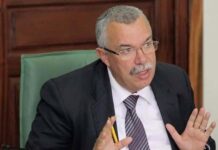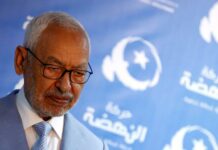The German Foreign Ministry has called for a road map for decisive constitutional reform in Tunisia, commenting on the country’s political crisis since the government’s dismissal and the suspension of parliament in July.
This was made in a blog post posted by German Foreign Ministry spokesman for the Middle East and North Africa Denis Kommitat on Twitter on Sunday, September 26, 2021.
Komitat said President Kais Saied’s actions were unilateral, without “growing concern about President Saied’s unilateral actions, and a roadmap for decisive constitutional reform. The rule of law and the role of parliament must be respected.”
Mass demonstrations in the capital against Kais Saied’s actions
Amid intense security reinforcements, on Sunday, September 26, 2021, some 3,000 demonstrators gathered in front of the municipal theater on Habib Bourguiba Street in the capital to protest what they described as “President Kais Saied’s exclusivity of the powers of government” after his decisions on July 25 to remove the prime minister, suspend parliament and assume the functions of the executive branch.
In addition, President Kais Saied extended the suspension of the terms of reference of parliament and the suspension of the privileges of deputies, in addition to lifting parliamentary immunity for all members of Parliament and continuing measures on the exercise of the legislature and the executive branch.
Saied issued a decree abolishing the time body to monitor the constitutionality of laws and continue to work with the first and second sections of the Tunisian constitution and all constitutional provisions that do not conflict with the exceptional measures taken in the country.
The demonstrators called on the president to step down, especially after his new decision this week, which protesters described as “ignoring the provisions of the 2014 Constitution.”
“Ennahdha Constitution”
Pro-presidential demonstrators who spontaneously took to the streets chanted slogans and chants in support of Saied’s actions, saying they would save the country from corruption and political conflicts and represent a correction of the revolutionary path.
They also called for the dissolution of parliament once and for all and the abolition of what they called the “Ennahdha Constitution”.
Opposition demonstrators, loyal to Ennahdha and its supporters, chanted slogans against Saied, demanding the return of parliament and non-constitutional violations, and the release of members of the Karama Coalition bloc.
Security between protesters from both sides is intervening with iron barriers, to avoid clashes and breakdowns that may be difficult to control.
Saied stressed that the measures taken by a judge continued to freeze the terms of reference of parliament, strip the immunity of its members, suspend the privileges allocated to them, and suspend a number of chapters of the 2014 Constitution, in preparation for the introduction of political reforms including the system of government and the electoral law.
He said the steps he had taken were necessary to break out of political paralysis and economic stagnation and address the weakness of action to combat the COV pandemic.
In reactions related to the presidential proceedings, 18 Tunisian and international human rights associations and organizations considered Said’s decisions to be the first steps towards authoritarianism in the country, as well as a turning point involving threats to the human rights and democratic aspirations of the Tunisian people.
These organizations affirmed their adherence to democratic principles, expressing their refusal to seize power in the absence of guarantees.
they stressed support for any process aimed at overcoming the current political and constitutional crisis provided that the rule of law was respected and the aspirations of the Tunisian people were democratic.
Under the title “The Closed Constitution,” researcher and political activist Sami Brahm wrote: “One of the strengths of the revolution’s “booby-trapped” constitution, as some snobs say, is locked in the face of tyranny, from which you cannot find an outlet for coups and derailments. Whenever you do it other than what his soul, the contexts of his deliberations and his textual unity require, you find yourself outside the legitimacy, reprehensible. “This has angered those who have a coup d’état and have called it closed and the origin is that it is a remarkable strand and a virtue that deserves to be valued.”
Rifi-JDD











